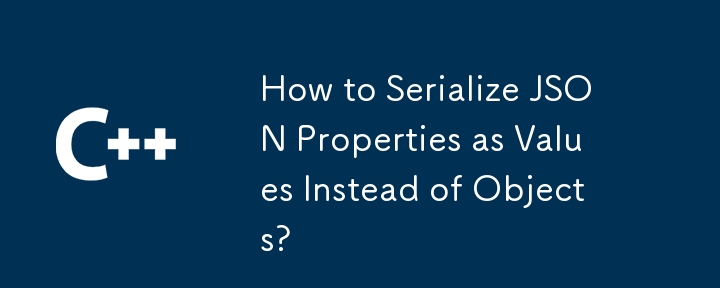How to Serialize JSON Properties as Values Instead of Objects?

Serializing JSON Properties as Values
When utilizing JSON representations in your code, you may encounter situations where you want to serialize a property as a value rather than an object. This is to achieve a more concise and desired JSON format.
Let's consider the following example involving the Car and StringId classes:
class Car
{
public StringId Id { get; set; }
public string Name { get; set; }
}
class StringId
{
public string Value { get; set; }
}
// Desired representation
{ "Id": "someId", "Name": "Ford" }
// Default (undesired) representation
{ "Id" : { "Value": "someId" }, "Name": "Ford" }The desired JSON representation eliminates the nested object for Id and directly displays its Value. To achieve this, we can employ two approaches:
Using a TypeConverter
By implementing a TypeConverter for StringId, JSON.NET will automatically use it to convert the property to a string:
[TypeConverter(typeof(StringIdConverter))]
class StringId
{
public string Value { get; set; }
}
class StringIdConverter : TypeConverter
{
// Implementation omitted for brevity...
}Using a JsonConverter
This approach requires you to add specific JSON.NET attributes to your StringId class:
[JsonConverter(typeof(StringIdConverter))]
class StringId
{
public string Value { get; set; }
}
class StringIdConverter : JsonConverter
{
// Implementation omitted for brevity...
}In both cases, the converter reads and writes the value directly, resulting in the desired JSON representation:
{ "Id": "someId", "Name": "Ford" }The above is the detailed content of How to Serialize JSON Properties as Values Instead of Objects?. For more information, please follow other related articles on the PHP Chinese website!

Hot AI Tools

Undresser.AI Undress
AI-powered app for creating realistic nude photos

AI Clothes Remover
Online AI tool for removing clothes from photos.

Undress AI Tool
Undress images for free

Clothoff.io
AI clothes remover

AI Hentai Generator
Generate AI Hentai for free.

Hot Article

Hot Tools

Notepad++7.3.1
Easy-to-use and free code editor

SublimeText3 Chinese version
Chinese version, very easy to use

Zend Studio 13.0.1
Powerful PHP integrated development environment

Dreamweaver CS6
Visual web development tools

SublimeText3 Mac version
God-level code editing software (SublimeText3)

Hot Topics
 How does the C Standard Template Library (STL) work?
Mar 12, 2025 pm 04:50 PM
How does the C Standard Template Library (STL) work?
Mar 12, 2025 pm 04:50 PM
This article explains the C Standard Template Library (STL), focusing on its core components: containers, iterators, algorithms, and functors. It details how these interact to enable generic programming, improving code efficiency and readability t
 How do I use algorithms from the STL (sort, find, transform, etc.) efficiently?
Mar 12, 2025 pm 04:52 PM
How do I use algorithms from the STL (sort, find, transform, etc.) efficiently?
Mar 12, 2025 pm 04:52 PM
This article details efficient STL algorithm usage in C . It emphasizes data structure choice (vectors vs. lists), algorithm complexity analysis (e.g., std::sort vs. std::partial_sort), iterator usage, and parallel execution. Common pitfalls like
 How does dynamic dispatch work in C and how does it affect performance?
Mar 17, 2025 pm 01:08 PM
How does dynamic dispatch work in C and how does it affect performance?
Mar 17, 2025 pm 01:08 PM
The article discusses dynamic dispatch in C , its performance costs, and optimization strategies. It highlights scenarios where dynamic dispatch impacts performance and compares it with static dispatch, emphasizing trade-offs between performance and
 How do I use ranges in C 20 for more expressive data manipulation?
Mar 17, 2025 pm 12:58 PM
How do I use ranges in C 20 for more expressive data manipulation?
Mar 17, 2025 pm 12:58 PM
C 20 ranges enhance data manipulation with expressiveness, composability, and efficiency. They simplify complex transformations and integrate into existing codebases for better performance and maintainability.
 How do I use move semantics in C to improve performance?
Mar 18, 2025 pm 03:27 PM
How do I use move semantics in C to improve performance?
Mar 18, 2025 pm 03:27 PM
The article discusses using move semantics in C to enhance performance by avoiding unnecessary copying. It covers implementing move constructors and assignment operators, using std::move, and identifies key scenarios and pitfalls for effective appl
 How do I handle exceptions effectively in C ?
Mar 12, 2025 pm 04:56 PM
How do I handle exceptions effectively in C ?
Mar 12, 2025 pm 04:56 PM
This article details effective exception handling in C , covering try, catch, and throw mechanics. It emphasizes best practices like RAII, avoiding unnecessary catch blocks, and logging exceptions for robust code. The article also addresses perf
 How does C 's memory management work, including new, delete, and smart pointers?
Mar 17, 2025 pm 01:04 PM
How does C 's memory management work, including new, delete, and smart pointers?
Mar 17, 2025 pm 01:04 PM
C memory management uses new, delete, and smart pointers. The article discusses manual vs. automated management and how smart pointers prevent memory leaks.
 How do I use rvalue references effectively in C ?
Mar 18, 2025 pm 03:29 PM
How do I use rvalue references effectively in C ?
Mar 18, 2025 pm 03:29 PM
Article discusses effective use of rvalue references in C for move semantics, perfect forwarding, and resource management, highlighting best practices and performance improvements.(159 characters)







